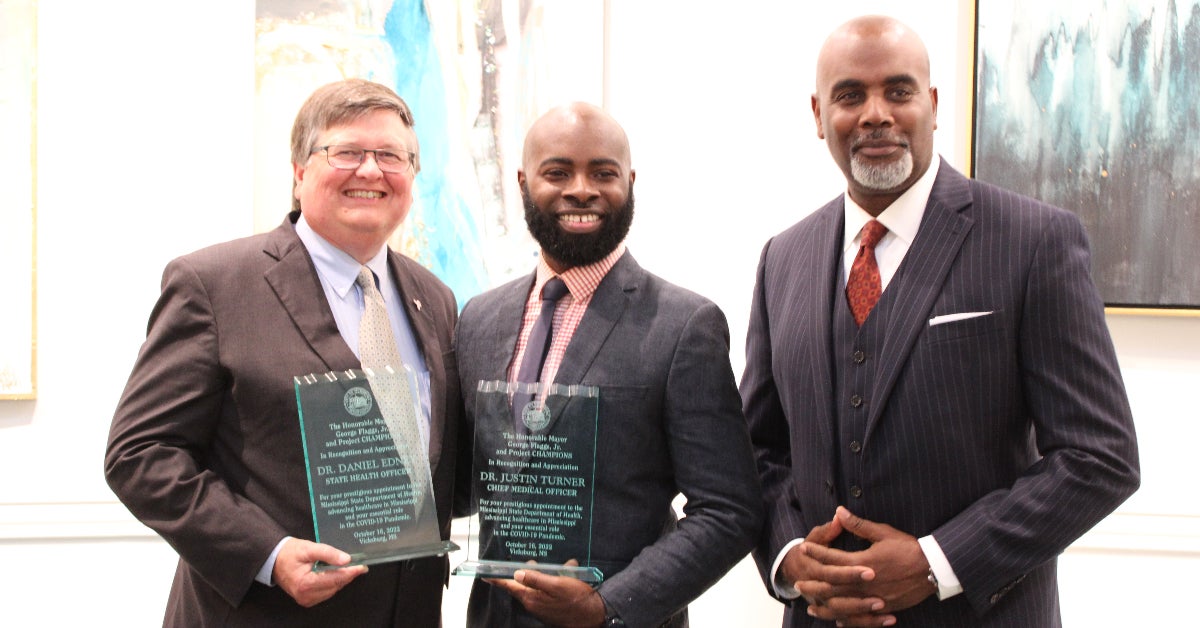Edney: Mississippi’s health care can no longer be on the bottom
Published 3:41 pm Tuesday, October 18, 2022

- Mississippi State Health Officer Dr. Dan Edney, left, and Chief Medical officer Justin Turner, both of Vicksburg, stand with Dr. John Gilford, Region 4 Regional Health Administrator for the U.S.Department of Health and Human Services Office of Regional Health Operations. Edney and Turner were honored Sunday at a reception honoring their appointments. (Photo by John Surratt | The Vicksburg Post)
Mississippi’s state medical officer is sounding the call and seeking public support for an important quest — elevate Mississippi’s health care system.
The state is at the bottom on so many health issues, said Dr. Dan Edney, and the time has come to affect change.
“Every physician in this state is sick and tired of us suffering on the bottom of health care indicators and being at the top of challenges,” he said. “We as physicians know that we don’t have to be there. We are at this point in society choosing to be different.”
Edney’s comments came at a Sunday reception honoring his selection as the state’s chief health officer and Vicksburg native Dr. Justin Turner as the state’s chief medical officer.
“As I speak across the state this is the message: that we must get off the bottom because if we’re on the bottom that means people are dying prematurely,” Edney said. “We cannot have people suffering from any type of diabetes or hypertension unnecessarily.
“We cannot have the highest rate of infant mortality in this country; we will not accept that as Mississippians we are fit folks, we love our communities, we love our families and our friends,” he added. “Our No. 1 job, as I see it, is to raise awareness of the struggles that are out there.”
According to the Center for Mississippi Health Policy, Mississippi’s infant mortality rate remains the highest in the nation at 8.8 deaths per 1,000 live births compared to 6 deaths per 1,000 live births for the U.S. Mississippi’s rate of maternal mortality is 22.1 per 100,000 live births. The national average is 17.47.
“We have to improve our healthcare experience,” Turner said, concerning the maternal mortality rate.
Edney said elevating medical care in Mississippi is going to be a challenge but he and others health officials and healthcare providers are ready to take it on.
“Everybody is rolling their sleeves up and working hard,” he said.
Edney said the lessons health officials learned while working with communities during the pandemic have taught them to listen to communities and work to develop a strategy to improve care and be ready to adapt it to the needs of the state’s different areas.
“It’s different in the Mississippi Delta from Southwest Mississippi Pine Belt,” he said. “It’s different worlds and we have to look at them differently and they have different challenges, different resource challenges, disparity challenges, outcome challenges and we have to look at each one differently.”
And, Edney added, he is optimistic the state can make the change.
“I’m convinced we can do this and the reason I’m convinced is that we have made such improvement in education; we were 50th in education my whole life. We can do this. We did it in education; we can do it with the health program,” Edney said.
“When you know the Delta as we do, we know the challenges our patients in the Delta face every day,” he said. “There are solutions: my job is to raise awareness and provide leadership for us to bring a coalition together and we do it together.”
And that will take leadership, he said, not just from the medical profession but from business, churches and academics.
“This is an attitude; an action and when we do that it requires some money; it’s not free,” he said. “If we choose to invest in public health, prove put money where we need it, we will get off the bottom. Fair warning: we are not going to stay last.”
“If we can go from 50th, where we are today, to 35th where education is now, that’s fewer orphans going into foster care because mama died from pregnancy, that’s fewer mamas crying because their child died at 6 months unnecessarily; it’s a senior citizen not living alone because their spouse died early from diabetes or hypertension,” he said.
There are real-life issues and there are solutions, Turner said.
“Be ready, pay attention,” Turner said. “we’re mobilizing the troops, we’re getting task forces together; we are about to change Mississippi for the better.”
When he talks about improving health care in Mississippi, Edney said, no one challenges him, adding they come to him after and ask what needs to be done.
“Leaders understand what the people want, what the people expect and we have some tough decisions to make. Join us as we do this,” Edney said. “We work better together; together we’re stronger. Change can’t wait. We have to get off the bottom.”






